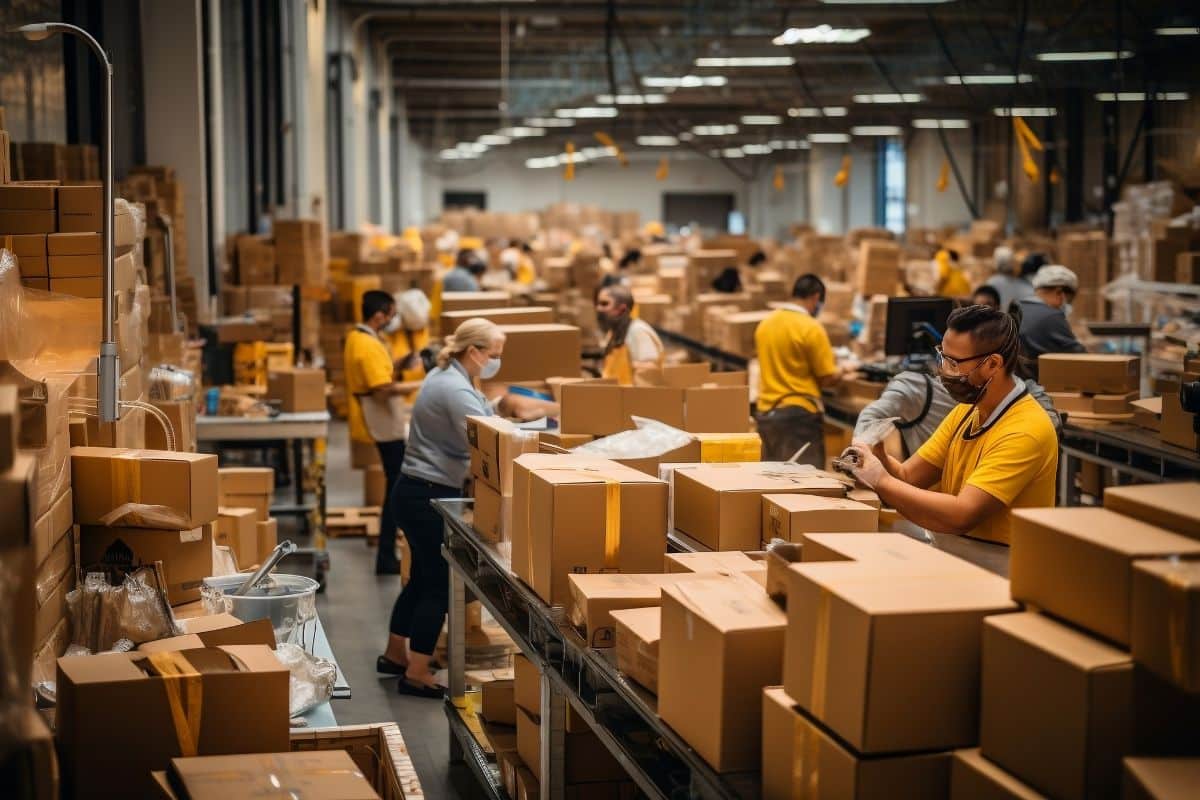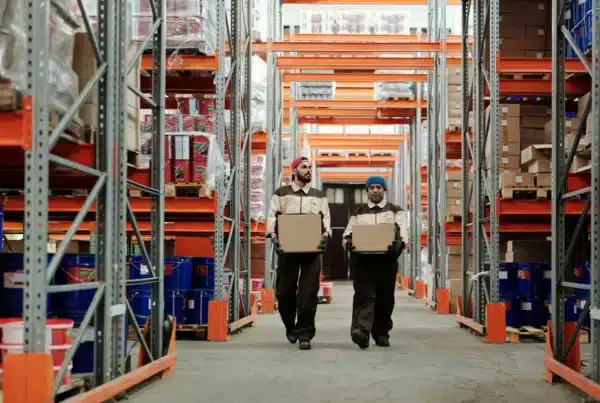
37% of consumers would not return to a retailer following a bad delivery experience.
So choosing a fulfillment partner for your business is one of the most crucial decisions you can make.
Disentangling your business operations from a bad partnership can be incredibly costly, time-consuming and complicated. Some businesses even decide to stick it out with a bad partner, because they would rather risk “the devil they know” than venture into the unknown.
To help your business avoid a partnership that can stifle growth and damage your brand’s reputation, we’ve created this list of six key considerations for choosing a potential fulfillment partner. You should always investigate these aspects of your prospective fulfillment partner thoroughly, no matter the industry you operate in.
The drawbacks of overemphasizing cost
Before we begin our list, we should first mention cost, since this will inevitably be a central consideration of any decision involving partnering with another business.
However, an overemphasis on cost can lead to a disregard for other important factors. It’s easy to select the most budget-friendly option, only for their flaws to cost your business more than a better-fitting partner would have. Paying less for the services of a fulfillment partner means very little if they are inefficient, lose inventory, repeatedly miss deadlines and struggle to scale to match your business growth.

Track record and reputation
A fulfillment company’s past will give you insight into a potential future with them. By asking for references from their current and previous partners, you can learn exactly what it’s like to work with them, including their highlights and flaws. This can help you make a more informed decision about whether they would be a good match for your business. Positive references are especially important for businesses considering outsourcing their fulfillment for the first time.
Companies that manufacture highly-regulated products, such as edible goods, will need a partner that has certifications from the FDA – the regulatory agency that oversees the nation’s food and drug supply chain. With an FDA-certified partner, you can be sure that warehousing complies with all standards required by the state and municipal health authorities and meets Current Goods Manufacturing Practice (CGMP) regulations.
This will also include the provision of strong audit trails and lot tracking. As a result, you will have the ability to track the movement of products and inventory precisely, making it easy to locate individual batches as necessary.
A fulfillment partner’s track record or commitment to sustainability may also be a deciding factor. Currently, a fulfillment partner with more sustainable operations will likely be more costly than one that is not. However, that cost disparity is constantly decreasing as sustainable technology becomes more affordable.
Longevity
Seeing who a fulfillment company has partnered with and for how long will tell you a lot about whether they would be a good match for your business. The longevity of a fulfillment company’s partnerships with other businesses is a strong indicator of several important qualities, including:

Services offered
The services offered by a fulfillment partner will play a crucial role in determining your compatibility. There will be services that you are looking for specifically, which will differ between industries and from business to business. Obviously, these are table stakes and it would be a dealbreaker if a third party logistics provider did not offer them. They include services like warehousing, shipping, picking and packing and returns processing.
Beyond these, though, there will also be additional services that could add value to your business, even if they were not originally elements you were considering outsourcing. For example:
Partnering with a fulfillment company that offers a full suite of services also streamlines your operations greatly. They will become a single point of contact for all your fulfillment services, removing the need for you to coordinate between multiple companies and, with that, the risk of things falling through the cracks.

Technology and integration
The right technologies can make or break your decision to use a fulfillment third party. Technology can play a critical role in the efficiency, accuracy and overall success of your fulfillment operations. One of the most key of these is automation.
Warehouse automation
By automating repetitive or time-consuming tasks, many fulfillment operations can be greatly streamlined, significantly reducing labor costs. Labor costs constitute around 65% of warehouse facilities’ operating budgets and warehouse/logistics employee wages have risen by over 14% since 2020.
Is it any surprise, then, that many operations are investing heavily in automation to reduce costs and shipping rates for their customers? The warehouse automation market’s value is predicted to surpass $36 billion by 2027 — more than double its $15 billion value in 2019.
This increasing investment in automation makes it crucial that you choose a fulfillment partner that is keeping pace with the rest of the industry. Opting for a partner that is more cost-efficient in the short term, but which hasn’t invested (or isn’t planning to invest) in automation, may result in your business falling behind.
Without automation, your fulfillment partner may be less able to scale up their operations to match your growth. As a result, with the fulfillment industry becoming increasingly efficient due to automation, your revenue may grow slower than your competitors’ as your partner’s operations can’t fulfill the order volume needed to keep pace with the increasing demand for your products.

Fulfillment software
Most fulfillment companies will use a variety of technologies to manage inventory, pick and pack orders and ship to customers, such as:
In addition, look for the capability to have this technology integrated with your business’s own platforms, such as ecommerce and enterprise resource platforms. A fulfillment partner should not feel like a third-party vendor but an integral part of your business and operations.

Communication
To be a good partner, a fulfillment provider needs to be able to communicate effectively with both you and your customers. When communicating with you, they should be able to:
In addition to communicating with you, they also need to communicate with your customers clearly, empathetically and with concision. For ecommerce fulfillment, in the instance of unexpected delays in delivery, this will help maintain customer satisfaction and minimize the risk of chargebacks or disputes. These interactions will include placating upset customers, reducing the odds of them canceling the order and demanding a refund out of frustration.
Some fulfillment companies will even handle customer inquiries and complaints themselves. This cuts out the intermediary and prevents time-consuming back-and-forths between your two businesses trying to determine the cause of lost online orders or damaged deliveries.

Transparency
When a fulfillment company is transparent, they are open and honest about their services, pricing and performance. This allows you to make informed decisions about your partnership and avoid any surprises down the road. It is never worth basing your decisions solely on pricing or reputation.
If a fulfillment provider is evasive about any of the following, that should be cause for concern.
A trustworthy fulfillment provider should provide you with metrics, such as order fulfillment accuracy, shipping times and return rates that cover a prolonged period. This information can help you track performance and identify any areas for improvement.

Final thoughts
This is merely a broad overview of the elements you should consider when finding a fulfillment partner. Depending on your market sector and business size, there will, of course, be more niche factors to bear in mind.
However, the six considerations above should always be at the forefront of your mind.
At Harte Hanks, we have provided fulfillment services to some of the largest and most identifiable brands in the world over the past 40 years. We offer a wide range of fulfillment services, including warehousing, kitting, print services, customer care outsourcing and returns processing, as well as the technology and expertise to integrate seamlessly with your business systems.
Contact us today to learn how we can help you improve your fulfillment operations and grow your business.
Contact us today

Jeanne is the Chief Client Officer for fulfillment at Harte Hanks. Jeanne’s client services team successfully manages all aspects of print and fulfillment programs. The team is focused on flawless execution while providing strategic input to ensure programs are meeting and exceeding our client’s business objectives.



